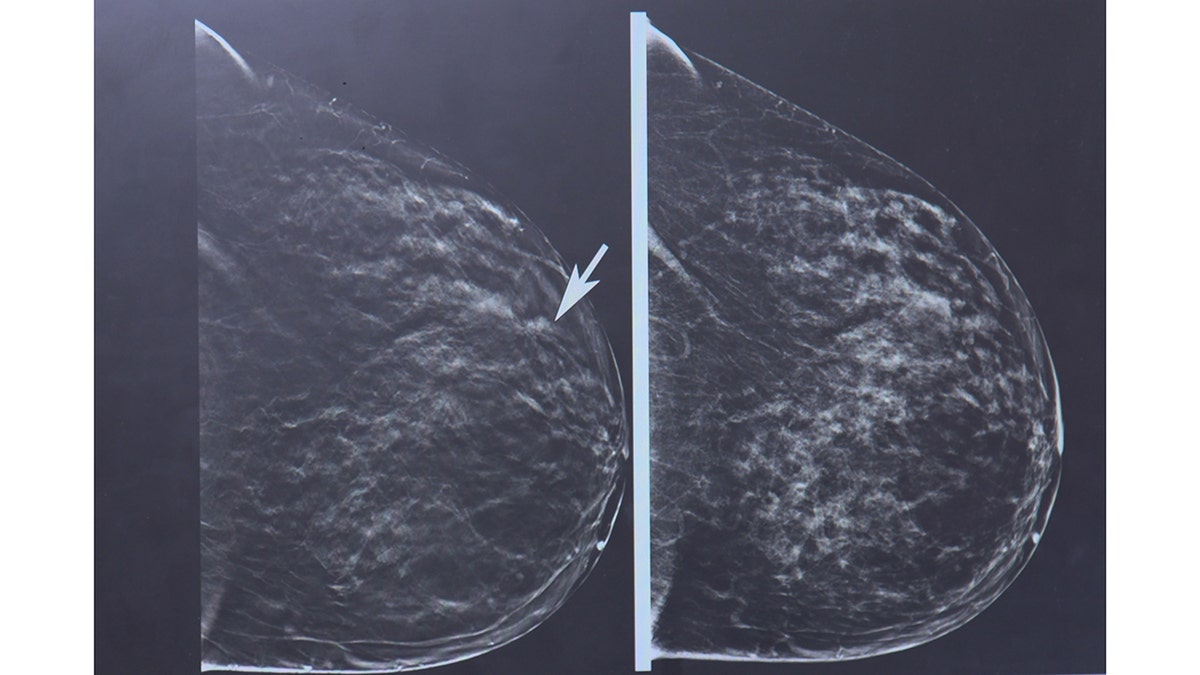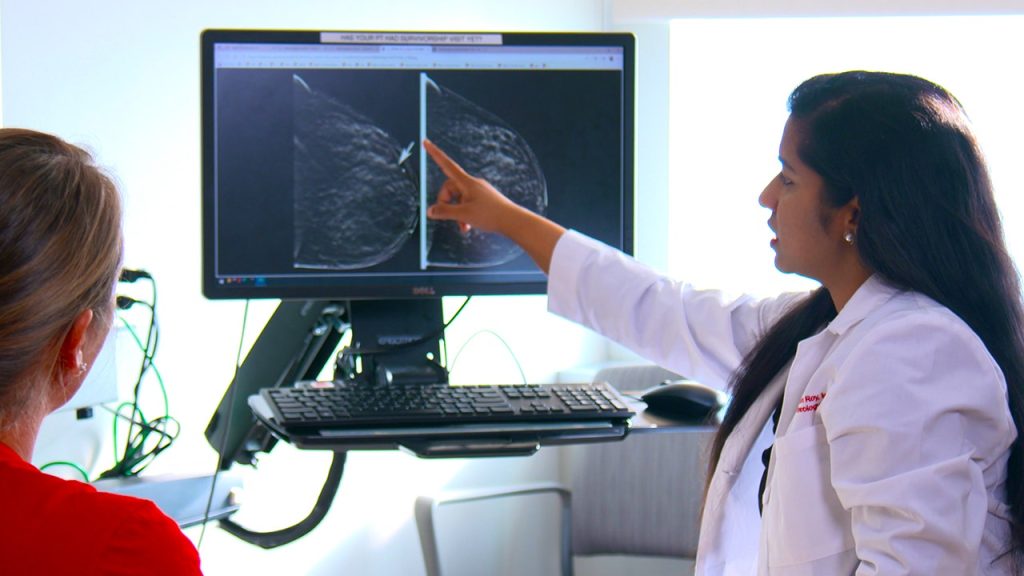NEWYou can now listen to Fox News articles!
Artificial intelligence is making its mark on the future of cancer care.
One of the newest applications for the technology is pinpointing hard-to-detect breast cancer.
Researchers at The Ohio State University Comprehensive Cancer Center – Arthur G. James Cancer Hospital and Richard J. Solove Research Institute are using AI in a preliminary setting to predict which patients may develop lobular breast cancer.
WOMAN BEATS DEADLY BRAIN CANCER WITH EXPERIMENTAL STEM CELL THERAPY: ‘TRULY AMAZING’
What is lobular breast cancer?
Breast cancer is the most common cancer in women and the second-leading cause of cancer-related death in the country.
Lobular breast cancer, which is aggressive and hard to detect, represents between 10% and 15% of breast cancer diagnoses in the U.S., data shows.

This is how lobular breast cancer can appear on a mammogram. Arya Roy, M.D., noted the cloudiness in the imaging, which would prompt her to recommend additional scans. (The Ohio State University)
Instead of a clump of cells that form a tumor, lobular cancer grows as a long chain of cells, so it shows up as a “subtle thickness” on mammograms. This means it can be difficult to spot until it has spread to other parts of the body, according to OSU.
This form of the disease also runs the risk of returning even after 10 years of the patient being cancer-free.
“We urgently need better tools … that can predict which patients are truly at high risk.”
Additionally, about 40% of women over 40 years old have dense breast tissue, according to the Society of Breast Imaging, which can pose a further detection challenge and a higher risk of developing breast cancer.
Although invasive lobular cancer grows, spreads and responds to treatment differently than the more common invasive ductal carcinoma, oncologists still follow the same guidelines for both diseases, according to lead researcher Dr. Arya Roy, breast cancer specialist at OSUCCC – James.
CLICK HERE TO GET THE FOX NEWS APP
“The genomic tests we currently use often give unclear or conflicting results for lobular cancer, which makes it harder for oncologists to decide on the best treatment,” she stated in the press release. “We urgently need better tools — specific to lobular cancer — that can predict which patients are truly at high risk.”
Cancer-fighting tech
Roy reiterated how difficult it is to identify lobular breast cancer from imaging.
“At the same time, it is very hard to identify the patients who are at higher risk of recurrence after treatments,” she told Fox News Digital. “So here is where we are using artificial intelligence techniques to identify the patients who are at risk of this cancer coming back.”

Shown examining a breast scan, Arya Roy, M.D., is researching a form of cancer that’s often missed in regular screenings. She’s using data from actual lobular breast cancer cases to train artificial intelligence to improve early detection. (The Ohio State University)
By combining AI models with digital pathology images, doctors can detect biomarkers and other indicators in high-risk cancer patients. Together with patients’ clinical data, these findings are used to create a scoring system that predicts the likelihood of cancer recurrence over the next decade, the researchers said.
The AI tool is currently in development, with clinical trials and a funded study on the horizon.
CLICK HERE TO SIGN UP FOR OUR HEALTH NEWSLETTER
“We hope that once we completely develop this artificial intelligence tool, which will help us identify the patients who are at risk of recurrence, we will be able to use it for all lobular breast cancer patients,” Roy went on.
“If we know that a patient has a 10% increased chance of this cancer coming back in five years, then we can keep that patient in close surveillance.”

The study researcher encourages women to discuss with their physicians whether additional imaging is appropriate for them. (iStock)
Oncologists can also use other imaging techniques to ensure that no cancer recurrence is missed in these higher-risk patients, Roy added, noting that this new AI-driven method could “give hope to a lot of patients.”
The oncologist encourages women to discuss with their doctors about whether additional imaging is appropriate for them.
Potential limitations
Dr. Harvey Castro, an ER physician and AI expert in Texas, was not involved in OSU’s study but commented on the findings to Fox News Digital.
TEST YOURSELF WITH OUR LATEST LIFESTYLE QUIZ
“The Ohio State study marks important progress in using AI to detect lobular breast cancer, a notoriously difficult subtype, but it also highlights the roadblocks that still keep AI from fully matching real-world complexity,” he said.
One of the biggest issues is training AI on old data, the doctor noted. “Medicine evolves quickly, and algorithms built on yesterday’s images may miss today’s patterns, which is what I call temporal drift.”
“Before these tools enter routine care, we must ensure they’re tested on real-world, diverse populations.”
Castro cautioned that many systems “perform beautifully” in a lab, but may stumble when tested in new hospitals or patient populations.
“Dense breast tissue remains AI’s Achilles heel,” he noted. “The same density that hides tumors from radiologists can confuse algorithms, too, especially across racial and age groups.”
CLICK HERE FOR MORE HEALTH STORIES
AI won’t replace radiologists, according to Castro — instead, it will redefine how they work.
“But before these tools enter routine care, we must ensure they’re tested on real-world, diverse populations, not just perfect lab data.”

